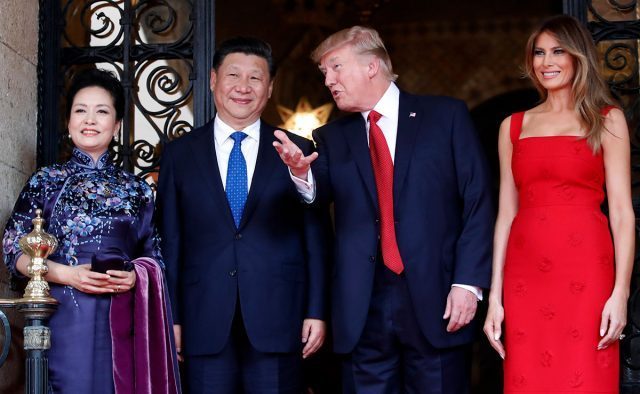The controversy over Chinese President Xi Jinping’s alleged remarks that Korea used to be part of China highlights a slew of sticking points that may vex South Korea’s next president in dealing with an assertive China and the unpredictable Trump leadership.
The comments were released by US President Donald Trump in an April 12 interview with the Wall Street Journal. During their summit, Xi explained the history of China and Korea, about “thousands of years ... and many wars. And Korea actually used to be a part of China,” Trump said.
It remains uncertain whether Xi actually made such remarks, whether Trump misinterpreted the statement or if there was a translation error. Foreign Ministry spokesperson Cho June-hyuck on Thursday flatly rejected Xi’s argument, citing “historical facts that no one can deny” and adding the agency is working to verify the authenticity of the remarks via diplomatic channels. Chinese Foreign Ministry spokesperson Lu Kang did not confirm nor deny it, saying South Koreans do not “need to worry.”
 |
President Donald Trump talks with Chinese president Xi Jinping, with their wives, before dinner at Mar-a-Lago, Florida, early this month. (AP-Yonhap) |
While drawing outrage among South Koreans, the revelation laid bare Beijing’s deep-rooted, imperialistic views on the history of the peninsula, as well as the Trump administration’s lack of historical understanding and diplomatic courtesy.
China maintains the ancient Korean kingdom of Goguryeo (37 BC to 668 AD), located across what is now the northern peninsula and southern Manchuria, was its vassal state. Under the so-called Northeast Project, Beijing has claimed its past sovereignty via state media, official reports and cultural sites, prompting diplomatic spats.
China’s growing assertiveness in the region has been a source of concern that has grown more serious recently due to its economic retaliation against South Korea for its decision to station the US’ Terminal High Altitude Area Defense anti-missile system here.
As for Trump, the exposure was seen as another blunder and a diplomatic faux pas both for Seoul and Beijing. But perhaps a more disturbing element was his lack of understanding of Northeast Asia, where long-festering historical and territorial rows often strain diplomatic relations, analysts said.
“Trump is basically a businessman, and therefore he appears to lack basic understanding of the regional dynamics,” said Park Byung-kwang, a professor at the Institute for National Security Strategy, who studies Northeast Asia relations.
“I think Trump may have interpreted Xi’s remark as an ordinary individual would without proper understanding. And it could have been delivered a bit more inaccurately through translation and explanation. It’s regrettable.”
Despite the furor, the event’s long-term diplomatic impact is likely to be limited, but may indicate a diplomatic challenge to be faced by Seoul’s next administration in dealing with the Trump administration, the experts said.
“I believe it is mostly a one-off event between Trump and Xi over their attempt to solve North Korea’s nuclear issue. Trump is still in a learning curve to reduce gaps between him and Washington’s foreign policy elite,” said Kim Han-kwon, a professor at the Korea National Diplomatic Academy.
Kim Heung-kyu, a political science professor at Ajou University, said, “If we take the remark at face value, it is quite offensive. But I guess Trump was seeking to warn Trump against discounting China’s influence and words in the face of his rising demands for a greater role in resolving the North Korea issues."
By Yeo Jun-suk (
jasonyeo@heraldcorp.com)







![[Weekender] Korea's traditional sauce culture gains global recognition](http://res.heraldm.com/phpwas/restmb_idxmake.php?idx=644&simg=/content/image/2024/11/21/20241121050153_0.jpg)
